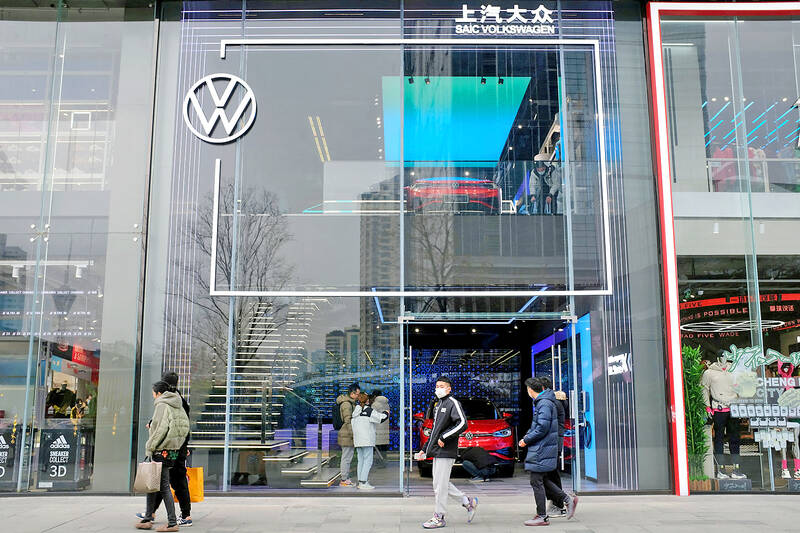German automaker Volkswagen (VW) on Wednesday said that it was discussing the future of its activities in China’s troubled Xinjiang region, following fresh allegations of human rights abuses.
The Handelsblatt daily reported that forced labor might have been used to build a test track in Turpan, Xinjiang, in 2019.
VW said it had seen no evidence of human rights violations in connection with the project, but vowed to investigate any new information that came to light.

Photo: Reuters
In an apparent sign of the growing pressure on the group over its presence in the region, VW added that it was in talks with its Chinese joint venture partner SAIC “about the future direction of business activities in Xinjiang.”
“Various scenarios are currently being intensively examined,” VW said in a statement.
Calls have grown louder for VW to reconsider its business activities in the region after German chemicals giant BASF SE last week announced that it would accelerate its exit from two joint ventures in Xinjiang.
Rights campaigners have for years accused Beijing of a brutal crackdown against Uighurs and other Muslim minorities in Xinjiang, including through forced labor and detention camps.
Beijing denies allegations of abuse and insists its actions have helped to combat extremism and enhance development.
Xinjiang is home to numerous factories that supply multinational companies, including big Western brands.
VW has long come under scrutiny over its factory in Urumqi, Xinjiang, which opened in 2013 and in which it has a stake via its joint venture partner SAIC.
An external audit commissioned by VW last year found no evidence of forced labor among the plant’s 197 employees, but the consultancy that wrote the report acknowledged “the challenges in collecting data” for audits in China.
The Turpan test track was not part of the audit.
Politicians from German Chancellor Olaf Scholz’s three-way coalition between the Social Democrats, the Greens and the pro-business Free Democratic Party have added to pleas for VW to quit the region.
Xinjiang “must become a no-go area for the economic activities of Western companies, including VW,” Renata Alt, chair of the German parliament’s human rights committee, told the Tagesspiegel newspaper.
“The human rights situation in Xinjiang is so catastrophic and intransparent that German companies should not operate there,” German lawmaker Frank Schwabe said.
Germany’s BASF led the way on Friday last week when it declared it would speed up the sale of its stakes in two companies in Xinjiang, citing mainly environmental and commercial reasons, but the move came after broadcaster ZDF and news outlet Der Spiegel said staff from its Chinese joint venture partner Markor were alleged to have been involved in Uighur rights abuses.
According to the reports, Markor staff had taken part in visits to homes of Uighur families to spy on them.
The German company said regular audits had shown no evidence of rights violations at the two joint ventures, but that the media reports “contain serious allegations that indicate activities inconsistent with BASF’s values.”

DIVIDED VIEWS: Although the Fed agreed on holding rates steady, some officials see no rate cuts for this year, while 10 policymakers foresee two or more cuts There are a lot of unknowns about the outlook for the economy and interest rates, but US Federal Reserve Chair Jerome Powell signaled at least one thing seems certain: Higher prices are coming. Fed policymakers voted unanimously to hold interest rates steady at a range of 4.25 percent to 4.50 percent for a fourth straight meeting on Wednesday, as they await clarity on whether tariffs would leave a one-time or more lasting mark on inflation. Powell said it is still unclear how much of the bill would fall on the shoulders of consumers, but he expects to learn more about tariffs

NOT JUSTIFIED: The bank’s governor said there would only be a rate cut if inflation falls below 1.5% and economic conditions deteriorate, which have not been detected The central bank yesterday kept its key interest rates unchanged for a fifth consecutive quarter, aligning with market expectations, while slightly lowering its inflation outlook amid signs of cooling price pressures. The move came after the US Federal Reserve held rates steady overnight, despite pressure from US President Donald Trump to cut borrowing costs. Central bank board members unanimously voted to maintain the discount rate at 2 percent, the secured loan rate at 2.375 percent and the overnight lending rate at 4.25 percent. “We consider the policy decision appropriate, although it suggests tightening leaning after factoring in slackening inflation and stable GDP growth,”

Greek tourism student Katerina quit within a month of starting work at a five-star hotel in Halkidiki, one of the country’s top destinations, because she said conditions were so dire. Beyond the bad pay, the 22-year-old said that her working and living conditions were “miserable and unacceptable.” Millions holiday in Greece every year, but its vital tourism industry is finding it harder and harder to recruit Greeks to look after them. “I was asked to work in any department of the hotel where there was a need, from service to cleaning,” said Katerina, a tourism and marketing student, who would

i Gasoline and diesel prices at fuel stations are this week to rise NT$0.1 per liter, as tensions in the Middle East pushed crude oil prices higher last week, CPC Corp, Taiwan (台灣中油) and Formosa Petrochemical Corp (台塑石化) said yesterday. International crude oil prices last week rose for the third consecutive week due to an escalating conflict between Israel and Iran, as the market is concerned that the situation in the Middle East might affect crude oil supply, CPC and Formosa said in separate statements. Front-month Brent crude oil futures — the international oil benchmark — rose 3.75 percent to settle at US$77.01